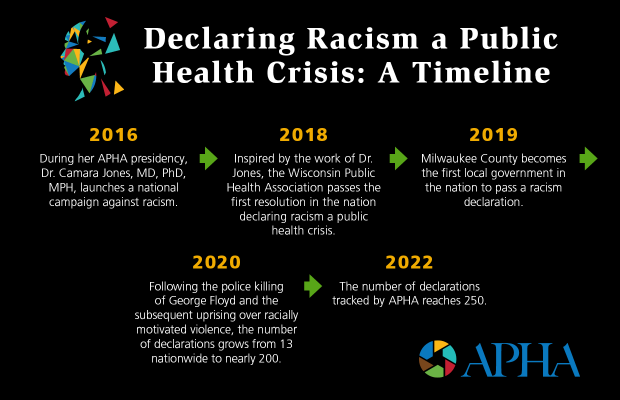At APHA, we understand the harmful effects that racism has on the health of our nation, and we are taking steps to mitigate these effects and achieve health and racial equity through our nation’s public health policies, practices, programs and workforce.
What is racism?
(APHA uses a racism definition from Past President Camara Phyllis Jones, MD, PhD, MPH.)
Racism is a system of structuring opportunity and assigning value based on the social interpretation of how one looks (which is what we call "race"), that:
- unfairly disadvantages some individuals and communities,
- unfairly advantages other individuals and communities, and
- saps the strength of the whole society through the waste of human resources.
What does it mean to declare racism a public health crisis?
When local governments declare racism a public health crisis, they are defining and acknowledging the harm racism causes to people of color’s health and wellbeing. Using data, local leaders can describe the health impacts to people of color due to social determinates of health, such as race, gender, socioeconomic status, education level, sexual orientation, and others.
By acknowledging the historical and contemporary effects of racism leaders are explicit about the unfair advantages people receive or do not receive based on skin color. These declarations also create a sense of urgency around the health of vulnerable populations, comparable to the response of infectious disease outbreaks and chronic diseases.

(View a text version of the timeline)
APHA’s role in racism declarations
Spearheaded by efforts of Dr. Camara Jones, past APHA President, the first declaration of racism as a public health crisis was passed in 2018 by the Wisconsin Public Health Association.
APHA began tracking declarations of racism as public health crisis in the summer of 2020. Since then, over 260 cities, counties, public health agencies and academic institutions have declared racism a public health crisis and have committed resources to dismantling the systems that have reinforced health inequity, replacing them with more equitable policies, practices and allocation of resources.
Racism Declaration Resources
What is racial equity?
Racial equity is what would exist if our society no longer assigned advantages and disadvantages, through society’s institutions, policies, practices and cultural beliefs, based on a person’s skin color. Racial equity looks at the root causes of inequities, not just the manifestation of the inequities itself, and focuses on the restructuring of institutional policies and practices and cultural beliefs. In this way, racial equity is central to health equity and achieving the healthiest nation.
To achieve racial equity, we must address injustices caused by racism and support actions at all levels to ensure equal opportunity for all.
How do we do that? Through racial healing, which involves ways for us to heal from the wounds of the past and build mutually respectful relationships across racial and ethnic lines. That means using a healing and heart-centered approach to get rid of the false belief that any person is superior to others based on their skin color.
Healing Through Policy: Creating Pathways to Racial Justice
 APHA's Healing Through Policy initiative offers local leaders a suite of policies and practices that are being implemented across the country to promote racial healing and address social inequities.
APHA's Healing Through Policy initiative offers local leaders a suite of policies and practices that are being implemented across the country to promote racial healing and address social inequities.
We also host a community of practice for jurisdictions that have declared racism a public health crisis to receive peer learning support.
Additional APHA Resources
Contact Us
If you would like to learn more about APHA’s racial equity work, please contact Lawrence Haynes at lawrence.haynes@apha.org.
Learn More